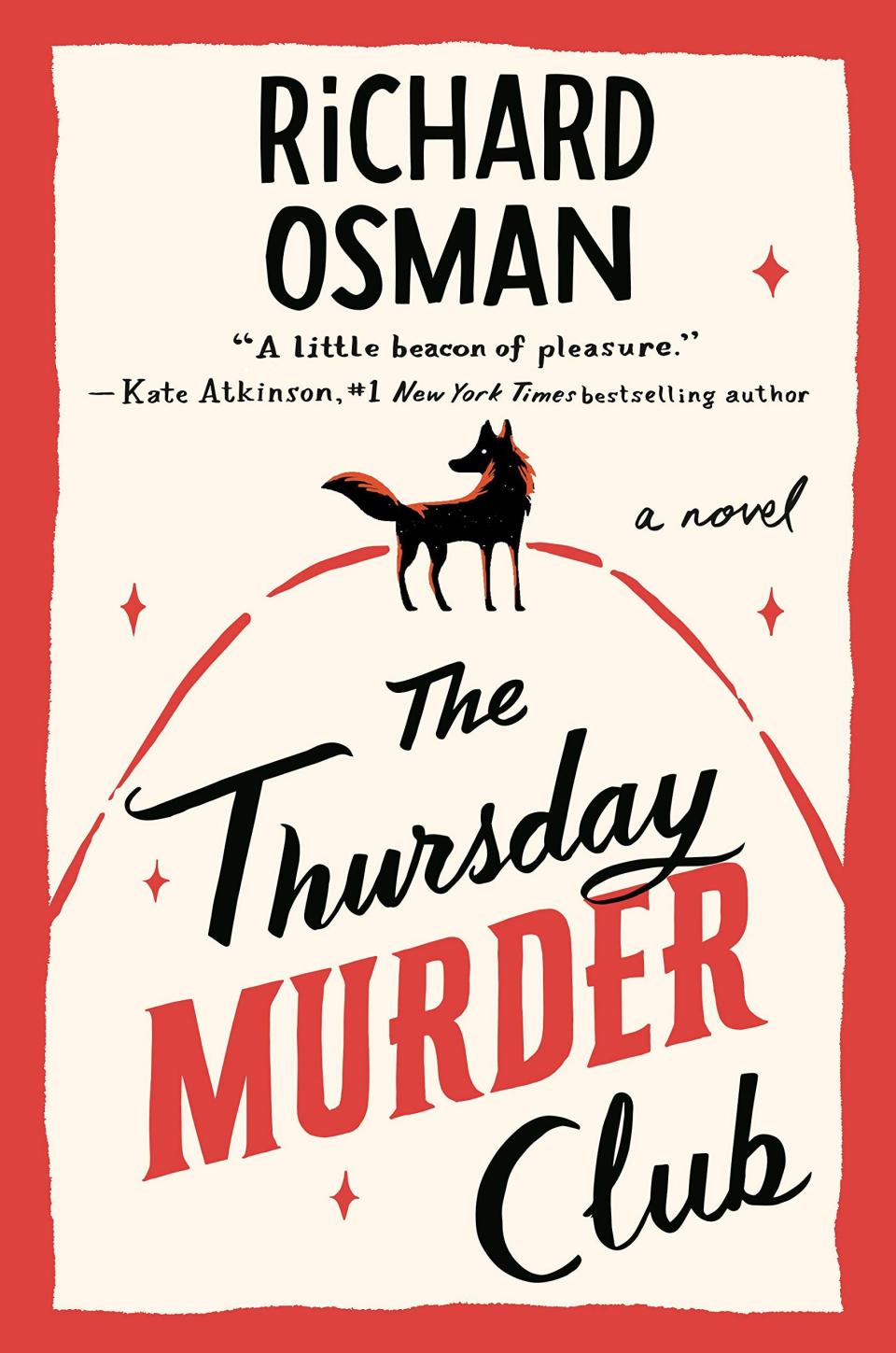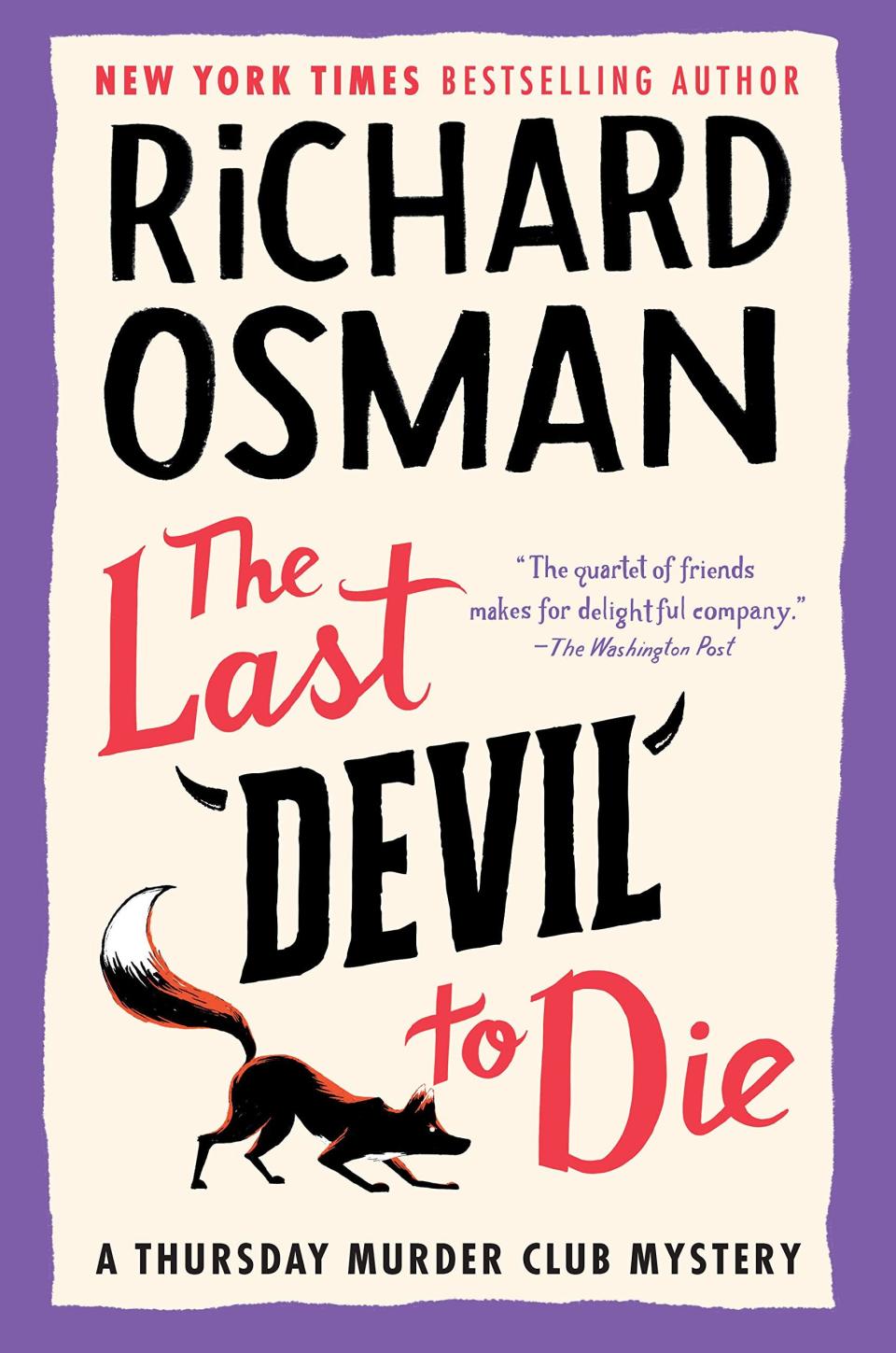Inside Richard Osman's Mystery Empire

- Oops!Something went wrong.Please try again later.
- Oops!Something went wrong.Please try again later.
"Hearst Magazines and Yahoo may earn commission or revenue on some items through these links."
This story contains spoilers for The Last Devil to Die.
There is something fitting about speaking with Richard Osman from my childhood bedroom. It's early August and I'm in Ottawa, Canada's capital, to visit my mother, who turned eighty-one just a few weeks before. She's lived in this house for almost forty years—the balance of my life. And she, like me and like millions of readers on both sides of the Atlantic and beyond, cannot get enough of Osman's Thursday Murder Club series of mystery novels, which feature a quartet of retirement village dwellers who band together to solve murders.
This is also the same room in which I made my enduring love of crime fiction into something resembling a career. During the conversation, in advance of the publication of Osman's newest mystery, The Last Devil To Die, I keep glancing over at the bookshelf, a time capsule of mass-market paperback titles by the formative crime writers of my late 1990s and early 2000s youth: people like Lawrence Block, Laura Lippman, Dennis Lehane, Mary Higgins Clark, and Walter Mosley. Their books were chiefly entertainments, yes, but they also opened windows onto contemporary society in ways that made me think more seriously.
They weren't so far removed from the Agatha Christie books I'd first read in high school—you still have to play fair in a mystery and plot it well—but they focused on series characters in a way that rendered them vividly human, not just passive chess pieces on the author's board. Enduring characters are what keep me coming back to authors and their mystery series.
When I first read Osman's debut, The Thursday Murder Club, a year after it had already stormed best-seller lists in England and elsewhere, I felt the same zing! as I did with those formative favorites and various subsequent crime novels in the two-plus decades since. I was catapulted back into reading purely for pleasure, which has become a rarity when so much of my time is devoted to reading for research, work, or critical purposes.
Authors who can reconnect people with the primal emotion of pleasure reading are worth our close attention. Commercial success doesn't just happen in a vacuum, after all—it takes a whole life, sometimes several iterations of that life, to get there, even as it often boils down to a simple idea: if you write what you want to read, and you enjoy doing so, others will want to read and enjoy what you write, too. Richard Osman knows this better than almost anybody.
Osman apologizes at the beginning of our Zoom call: he's on his phone, held close to his face in what appears to be his home office, rather than his laptop. A rainbow pinwheel hangs off the brick wall behind him, and a fake cactus with a red ribbon tied around one of the stalks sits to his right. But technical difficulties are soon forgotten over the next hour of studied delight. The charm and self-effacement is real, but there's also little question that Osman is well-versed in pleasing whomever he's in conversation with.
Perhaps that’s because the study of popular culture and mass entertainment has been Osman's lifelong project, one that began in 1970 as the younger son of a single mother in West Sussex. While Mat, three years older, was perpetually obsessed with “being cool” (he later became the bassist for the Britpop band Suede and recently published his second novel), Richard had no such aspirations.
An early career highlight was getting a column in Golf Monthly at the age of fifteen. Another was reviewing shows for the music magazine NME, which was, perhaps, a “cooler” pursuit. Both contracts, Osman told me, happened the same way: “I read both of the magazines, I looked up who the editors were at the front of each magazine, and I sent them unsolicited articles. They both very kindly read them and started employing me. I don't think they knew I was fifteen!”

He also gravitated toward crime fiction, starting with Enid Blyton’s Famous Five Books and then reading Golden Age stalwarts like Agatha Christie, Dorothy L. Sayers, and Ngaio Marsh, all of whom featured prominently on his mother’s bookshelves. “He never went through that stage that I think most of us do, the kind where you're suddenly reading Penguin Modern Classics and watching French films and stuff like that. It never happened for him,” Mat Osman told me. Richard, rather, cared most about the things most people in Britain loved: snooker, sports, Saturday night telly. As he put it to me, “my natural sensibility is very monetizable.”
It would be some years before he figured this out in a professional capacity. Osman arrived at Cambridge in the late 1980s intent on studying American politics as his major. “Richard, like all of us, was still a work in progress at that stage, but the signs of who he might become were there for all to see,” said Alexander Armstrong, who first knew Osman at Cambridge and later became his longtime co-host on the quiz show Pointless, writing to me in an email. “Being 6’7”— and I’m guessing quite newly 6’7” in those days—meant he had to deal with being conspicuous whether he liked it or not. But he was popular, funny, and prodigiously intelligent—people used to gather round Richard—so my impression was he probably did like it. I hope so.”
Osman did, in fact, like it, and the prospect of making entertainment people would enjoy appealed far more than politics; after graduation, he quickly secured a job with the television production company Hat Trick. By twenty-eight, Osman had executive produced a BBC morning show, worked on the UK version of Whose Line Is It Anyway?, and co-created the six-episode comedy series Boyz Unlimited, a music industry satire starring a young, pre-fame James Corden.
At the time, Osman was riding high, but Boyz Unlimited proved to be a bump in the road. The show wasn’t renewed for another season; “that's two years of your life done,” Osman mused. It put him off writing for years. He would instead spend the next two decades at the production company Endemol, eventually as creative director, creating quiz shows like 8 Out of 10 Cats and Pointless, the show that would change his life irrevocably.
Launched in 2009, Pointless has a simple concept: to come up with the most obscure, but still correct answer. Osman wasn't supposed to co-host the quiz show, but the BBC was so impressed with his presentation (and his chemistry with Armstrong) that they asked him to step in front of the camera—“the easiest thing I've ever done,” he told me. Pointless became a tea-time staple, and only last year did Osman feel ready to leave his daytime co-hosting duties.
Television was more than a childhood love for Osman: it was a way of seeing the world when it was difficult to envision it properly. Osman has congenital nystagmus, a visual disorder that causes the eyes to make repetitive, uncontrolled movements in every possible direction and speed. It makes reading physical books difficult (he prefers audiobooks these days), TelePrompters all but impossible, and also explains why the visual descriptions in his novels are sparse. But if he set himself up a couple of inches away from the television screen, the world was far more accessible and open to him. “Let's say I go for a long walk in the woods, or up a mountain, and people say, 'look at that view,'” he told me. “I'm sure it's terrific. Whereas if I watch a nature program on television, I can see all of those things.”
Pointless turned Osman into a celebrity, which has a somewhat different flavor in the UK. His moves could be tracked by tabloids like the Daily Mail and the Sun, and he could guest-star on later-night comedy shows like Have I Got News For You. Then there was the time that Heat magazine—which I'd first heard of during my own summer in London in 2003, thanks to its twin obsessions with proto-influencers Katie “Jordan” Price and Jodie Marsh—named Osman its “Weird Crush of 2011,” a data point forever brought up in interviews over the next few years. There's an alternate universe in which Osman stayed rooted in UK celebrity land, where few mortals are allowed to cross over into more global entertainment territory.
But then he had a story idea—one he kept secret from almost everyone. It wasn't difficult to pursue; quiz shows are filmed in bursts, which left a lot of down time during the various breaks between seasons of Pointless. He was also filming a new, celebrity-oriented show, Richard Osman's House of Games, which debuted in September 2017. All of that love of information and knowledge, and of crime fiction in particular, had to go somewhere. And his mother, now living at a retirement village, offered an endless supply of stories about the lives of the other residents. They could be anyone, anything—maybe even spies, once upon a time.
Four characters emerged (“the four corners of my brain”, Osman told me), as did a wicked premise: what if this quartet got together every Thursday to discuss, and maybe even solve, some cold cases? There was Joyce, the former nurse; Ibrahim, the retired psychiatrist; Ron, the political activist, still in thought if now less in deed; and Elizabeth, the probable if unlikely spy. Think of the Vidocq Society (well, before it was essentially discredited and discontinued) filtered through an Agatha Christie sensibility. “Cosy crime,” spelled the British way, has historically had more bite than the American definition (the one with a “z”)—though that is also changing, as this subgenre has grown more diverse and community-rooted.
For months it all existed in Osman's head, before migrating to page after blank page. He read through the entire “Ripliad” (Patricia Highsmith's five-book sequence featuring the art forger anti-hero Tom Ripley) as he worked through the manuscript. He revisited the greats, like Christie and Sayers, as well as the newer crime and thriller stalwarts, like Lee Child, Ian Rankin, Val McDermid, and Kate Atkinson (though she, of course, can and does write whatever she likes.) Whenever Osman got stuck on a plot point, he found himself writing in the voice of Joyce—the character most like him. “She likes to sit and think and work things out,” Osman explained in 2020. “I enjoyed listening to her doing that, and writing it all down for her. For large periods of writing I felt I was possessed by the spirit of a 76-year-old woman, and I have to say I recommend it to anyone.”

Then he felt ready to sound out a friend: Mark Billingham, a best-selling crime writer with a background in the comedy world who could tell him whether it was crap or good. He bought Billingham lunch and told him the idea. “As soon as he told me the basic premise of The Thursday Murder Club and outlined who the characters were, I just knew it would work,” Billingham told me. “He absolutely had to write this.”
For Osman, it was gratifying to hear from someone he admired and respected. But he also wanted to know what rules, if any, he needed to follow to write the kind of crime fiction that would sell to a publisher. “Richard and I have sworn close to an oath of blood that we will never reveal what those rules were; we’ll never reveal exactly what I told him,” Billingham said. (He quickly followed up that it was “nothing earth-shattering” and mostly to do with playing fair with the reader.)
Osman kept on, and when he was close to finishing a draft, he reached out to literary agent Juliet Mushens, who had represented a companion Pointless book co-authored by him and Armstrong. Mushens didn't take long to register her enthusiasm for the Thursday Murder Club manuscript. She thought it was “fiendishly and deceptively clever.” She knew it would sell. She knew it would sell big. Mushens concluded a multi-publisher auction in Germany before the UK auction (itself involving ten publishers, with Penguin as the eventual winner), which tipped her off that this book was something special. It wasn't some UK “celebrity novel” with limited appeal elsewhere, but rather the exact opposite. Something, dare we say, universal.

amazon.com
$48.10
Certainly Osman's American publisher, Pamela Dorman, who runs her own imprint at Penguin Random House, had little idea of Osman's fame as a quiz show host when she won the US auction. She responded to Joyce, Elizabeth, Ibrahim, and Ron in the way she had with Eleanor Oliphant, the titular character of Gail Honeyman's smash hit debut novel. The puzzle was fine, but it was about the people.
So far, so charmed. The Thursday Murder Club could have been met with the indifference that marks so many book publications, but the early clue about the German publisher auction was more harbinger than fluke. The novel, published in September 2020, was the fastest-selling crime novel in the UK. The hardcover would spend 27 out of 36 weeks on the best-seller list at #1, and another 31 weeks topping the paperback charts.
The accolades accumulated with the ensuing installments, The Man Who Died Twice and The Bullet That Missed, so much so that the series, with the fourth book soon to hit shelves, has now sold 6.6 million copies in Britain, another 1.7 million in “export markets” (countries that also sell the UK edition), and nearly 1.5 million copies (in all formats) in the US. It seemed impossible to find someone who hadn't read at least one of Osman's novels. “My 99-year-old aunt is obsessed with them, but so is my 21-year-old niece,” said Penguin Random House UK CEO Tom Weldon. “He crosses generations.”
So what is it about the Thursday Murder Club books that make them so broadly appealing? The simple answer is that they are really good. The writing is pithy and fresh, so much so that I kept writing down lines from The Last Devil To Die. Osman describes a character who comes into the group’s orbit “only because Joyce couldn't resist a deep voice and a sense of mystery.” Early on, the club wonders if “it might be nice for the Thursday Murder Club to have a new project that moved at a gentler pace than usual. Something a bit less murdery would be quite a novelty.”
But there’s more than just quotable sentences at work here. Osman’s plots play fair with the reader, carefully placing “red herrings” to fool the reader into picking the wrong possible murder suspect—a gambit that has improved with each successive book. The endings feel both inevitable and earned: the exact combination one wants in a good mystery.
Osman also has empathy for every character, no matter their station or how briefly they appear in the narrative. In The Last Devil To Die, Osman managed to make me feel sad about every individual who ends up killed, which is quite a feat—it’s what mystery novels are supposed to do, but far too many forget that even possible suspects should be treated with dignity and care, not just the protagonists.
Writing the best possible books year after year is within an author’s control. Nothing else is. But for Osman, publishing the first Thursday Murder Club book in September 2020 proved to be an accident of good timing. The world was still broadly in lockdown, with all of us shut in our houses, terrified of a virus that would kill millions and debilitate countless more. So many avenues of entertainment were cut off, but reading was not. And when things are awful on a day-to-day level, why not sink into a mystery that makes us feel good and restores order from chaos, even as it never devolves into outright denial of reality?
This is not a new phenomenon. Agatha Christie had been publishing mysteries for over two decades when the Second World War made her a household name, and she began her career in 1920, two years removed from the end of the WWI and the influenza pandemic. Osman’s greatest strength is fusing the puzzle-mastery of Christie and her Golden Age peers with emotional earnestness and wry humor. Mortality is a subject simply too great to be avoided entirely, but it can be done without sinking into despair.
There's one scene in The Last Devil to Die that made me stop everything. My mind slowed, and I couldn't speak or even do much of anything for the rest of the day. Everyone I spoke to for this story had similar gut-punch reactions to this scene, which I think of as “The Letter Scene.”

amazon.com
$26.10
What begins as a mystery—who has been writing such detailed letters to Elizabeth about her husband Stephen's deteriorating battle with dementia?—becomes the beating, moving, wrenching heart of the novel. As Osman writes, “She had been losing him a paragraph at a time, but the chapter is done. And the book is close to its end.”
It's only a spoiler in the way that living with dementia, be it in real life or in fiction, is the ultimate spoiler. Your faculties ebb away and then, in an abrupt or gradual manner, or sometimes both at the same time, they disappear altogether. Loved ones are erased from your consciousness. Personalities change. Death isn't the cruel part: the replacement of a full life with mere existence is.
Because readers have come to care for all of these characters so deeply, losing one—even one whose death has been foretold throughout the series—is unbearable, in the way that losing any loved one creates an unbreachable chasm between past and future. For a quartet putting so much energy into solving crimes, creating community, and having each other's backs, such pursuits can be put aside in the face of grieving someone they loved: “They still have each other, but not today. There will be laughing and teasing and arguing and loving again, but not today. Not this Thursday.”
Osman has said on multiple occasions (and reiterated it to me) that Joyce, Elizabeth, Ron, and Ibrahim “are going to live in perpetuity.” But next year's book will be something different: the start of a new series featuring a globetrotting young woman and her stay-at-home father-in-law, both of whom are drafted into solving international crimes. It's the sensibility and humor of the Thursday Murder Club books crossed with The Da Vinci Code. Osman began writing the book just last month.
Switching gears now makes sense. The quartet needs a rest, and The Last Devil to Die is a natural pause point. Moving on to a new project, even temporarily, also arrives after some recent major changes in Osman's life. He left Pointless in May 2022, and later that year married the actress Ingrid Oliver (Osman has two adult children from a prior relationship). They share a cat, Liesl, who stars on his social media feeds.
“I don't want to be a one trick pony,” Osman said. “It doesn't interest me. I love those characters, and I will keep writing them. But I want to see what else I can do and what else I can write. It's exciting for me to see what else is in my brain. And if it's a disaster, then there will be thirty more Thursday Murder Club books.”
Osman then tells me a story that I’d already heard from multiple sources: how, at the Harrogate Crime Festival in July, he put his credit card behind the bar one night, and said that anyone who uttered the phrase “Ron’s forgotten the password” would get a free drink. He ended up buying an extra round for all the attendees that night.
“It's a symbiotic relationship, isn't it?” said Osman, talking about the relationship between the author, the reader, and the entertainment business. “And it would be churlish to pretend that's not the case. So you know, it's lovely to spread joy and happiness. But equally, it's lovely that readers are complicit in that. Listen, I can't buy everyone in America a drink. But anybody reading this? Who comes up to me and says, ‘Ron’s forgotten the password’? I will buy you a drink on the spot, I promise.”
Osman and I end the Zoom call a few minutes later. I'm still thinking about the last line in The Last Devil to Die, uttered by Joyce but equally an encapsulation of Osman's relationship with his readers: “I know it sounds silly, but I feel less alone when I write. So thank you for keeping me company, whoever you might be.”
I grab my advance copy of the book and head downstairs to the kitchen, where lunch and my mother await. Her face lights up as I hand it to her. Later that evening, we'll keep each other company in our favorite activity: reading, silently, immersed in the worlds that only books can create out of wholesale imagination.
You Might Also Like

